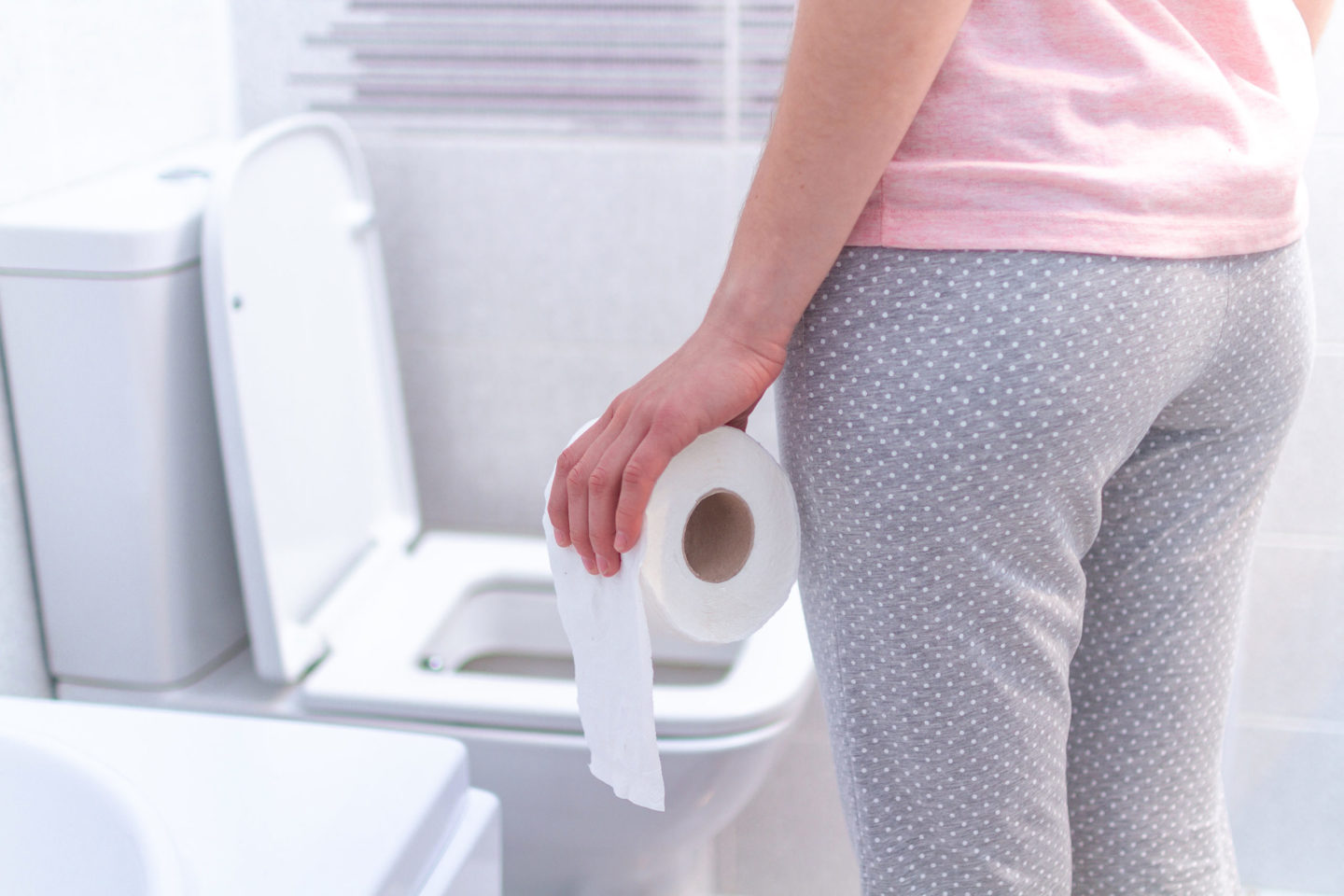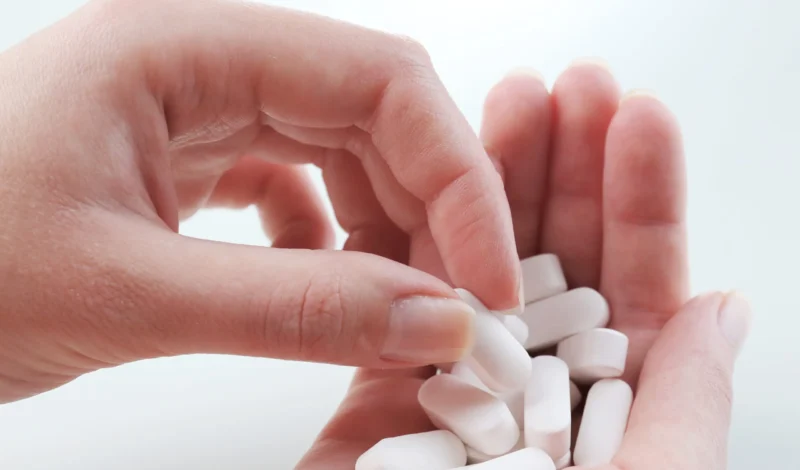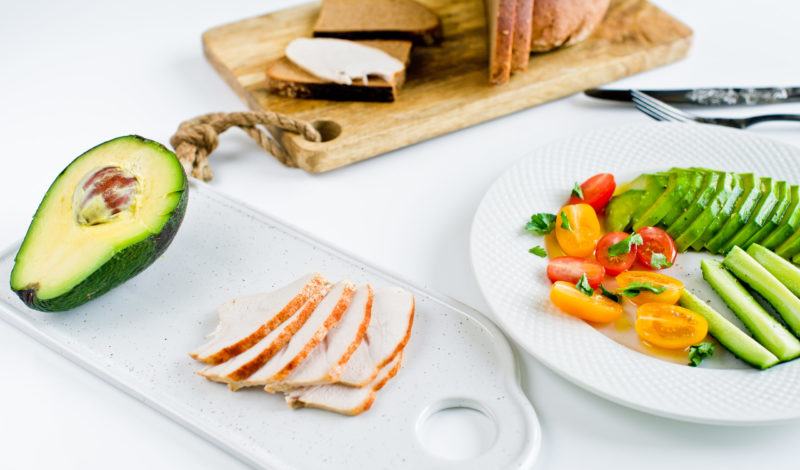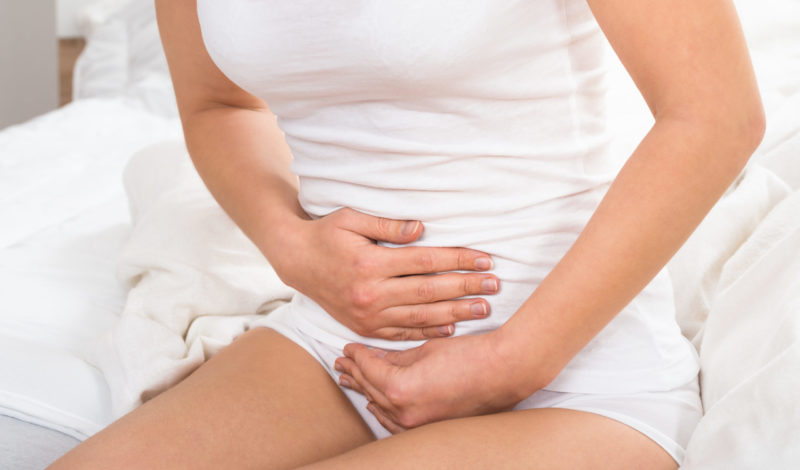The possible causes for irritable bowel syndrome are diverse and vary from person to person. Therefore, it is often not [...]

Many suffer from it, only few talk about it
These are the most common causes of diarrhea
The runs, backdoor trots, meals on wheels: Probably there are so many synonyms for diarrhea in our colloquial language because nobody likes to talk about it if it runs too smoothly. This nasty rumbling in the stomach that promises nothing good – our days would be better if we wouldn’t have to deal with it.
As a matter of fact, we should always be near a toilet and still, we don’t want to use them all, especially on vacation (just think about the toilets at gas stations… eeeewww!). If we have diarrhea, the bowel is in a state of emergency, but it can be repaired.
In the medical textbook, diarrhea is defined as more than three defecations of a fluid bowel movement per day. And now it gets bizarre: “the weight of the stool must be more than 250 grams”. Who weighs that? Forget the scales and just remember: you have diarrhea if you either produce a very large amount of stool more than three times a day or if it is very liquid. By the way, diarrhea alone is not a disease, but only a symptom, mostly for bowel disease and there are different forms of it.
Montezuma’s revenge
Montezuma was the last ruler of the Aztecs. In the 16th century, he warmly welcomed Spanish conquerors to his country unsuspectingly. Unfortunately, he paid for his kindness with his life. His revenge, it is said, is diarrhea we suffer on our travels to distant lands.
The real reason for travel diarrhea is bacteria like Salmonella, Campylobacter or Coli bacteria. You introduce them through contaminated food or drinking water. That’s why it’s better not to eat anything off the road on holiday, even if it’s so authentic, not to drink water from the tap and not to use ice cubes in drinks. If you throw up, it’s called food poisoning.
Normally, these bacteria do not survive gastric acid. But if there are too many or you are taking drugs that slow down the production of gastric acid, the bacteria will make it into your intestines. They cause a lot of unrest. Different pathogens trigger different processes.
Coli bacteria ensure that the intestinal wall releases a lot of water and salts. The intestinal mucosa, on the other hand, absorbs less water. Suddenly there is much more water in your intestine than normal and that comes out at the end, along with everything else. More precisely: it flows. This is called secretory diarrhea. With exudative diarrhea, the mucous membrane in the intestine becomes inflamed and a lot of mucus forms, sometimes even blood. If the cells in the mucous membrane are attacked by the bacteria, they cannot absorb the food so well, and the digestion will no longer work as it should. The undigested food residues draw water from the intestinal wall into the interior of the intestine. This means osmotic diarrhea. All these processes happen within a few hours. This explains why diarrhea usually surprises us so badly.
The gastrointestinal flu
Here are the viruses at work and they cause a great impact for they do not only cause diarrhea but also vomiting in extreme cases. The most common pathogens are noroviruses and rotaviruses. These stubborn viruses have some hidden tricks to get into your stomach and thus also into your intestines. If you, or someone in your environment, have the virus, strict hygiene is required. Otherwise, the viruses will stick to door handles or taps and get through your hands, to your mouth, into your stomach. The Norovirus is even more tricky and transmits itself through the air. You don’t even have to sneeze or cough, talking is enough to transfer the virus to another person through small spit droplets. Otherwise, if you are healthy, the intestinal viruses are not so bad for you. Normally diarrhea and vomiting disappear after a few days. Babies, children and the elderly must see a doctor. The loss of fluid can be very dangerous for them.
When it’s too much for your gut
Your intestines can’t get enough of vegetables, fruit and wholegrain cereals. With some medications, too much alcohol, coffee or candies, it can make you tired. Especially with sugar-free processed food or chewing gums that contain sweeteners, might make you run to the toilet. The diarrhea will quickly stop if you don’t take any more of it. It is different from an intolerance or allergy when your intestine can no longer break down and utilize certain components of your food as it should. Lactose intolerance means that the intestine has a lack of lactase, which breaks down lactose. This results in severe abdominal pain, nasty flatulence, and diarrhea. The same happens if you do not tolerate fructose or have celiac disease, then you do not tolerate gluten, the grain protein. You can find out whether your intestine does not tolerate certain foods with a test. If you change your diet and leave out the indicated foods, diarrhea should also disappear.
Don’t do this! Coke and salt sticks against diarrhea
With diarrhea, the body tries to get rid of harmful substances as quickly as possible by washing them out with plenty of water. If you don’t drink enough to replenish your water balance, your body may become dehydrated. The water also washes out important vitamins, minerals, and salt. Surely you know the old household remedy coke and salt sticks. Meanwhile, you know, it doesn’t help! It can make diarrhea even worse. The salt sticks contain salt, but otherwise hardly any minerals. The coke is way too sweet with 10% of sugar. The sugar can make everything even worse and the carbonic acid does the rest.
Ginger and crackers, activated charcoal and fruit
In the USA, ginger ale and crackers are the household remedies against diarrhea. However, fresh ginger is better than sweetened ginger ale lime. It has an antibacterial effect and you can make tea from it pretty easily. Peel a piece of a tuber, pour hot water over it and let it brew. The crackers are easily digestible and salty, but they should be unseasoned and not too greasy.
There are many other home remedies, such as charcoal tablets, which you can also find in every first-aid kit. They are particularly helpful when bacteria have entered your intestines. The activated charcoal binds the toxins and helps the intestines to get rid of them.
Classics are also grated apple and banana. Apple contains a lot of pectin, which lies like a protective gel layer over the intestinal mucus wall. The bacteria can do nothing more and are flushed out. It is important that you finely grate the apple with its skin.
The banana contains starch, vitamins, and minerals, many of which are potassium. The mineral balance is replenished immediately, and the potassium has an additional relaxing effect.
Diarrhea’s not fun for you or your bowels. Even if you pay attention and take all good advice, infection by viruses or bacteria cannot always be avoided. If you do get caught, be good to yourself and help your gut to fight the pathogens. If the diarrhea lasts longer than a few days, then it is better to go to a doctor so that you can quickly replenish your water and mineral balance.



